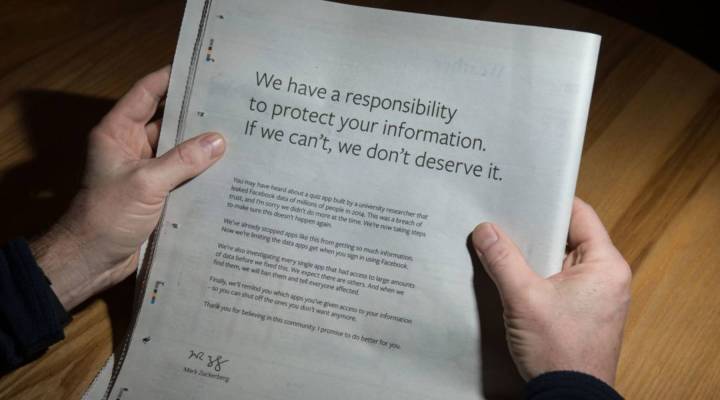
Should we be getting paid for providing data?
Should we be getting paid for providing data?

Facebook may be considering an ad-free subscription model that would let you pay to opt out of sharing your habits and personal information. But that raises the question: Why should we pay Facebook not to take our information instead of the other way around? That is one of the ideas explored in a new book called “Radical Markets: Uprooting Capitalism and Democracy for a Just Society,” which suggests that all of us are working as unpaid data laborers. Glen Weyl is one of the authors and a principal researcher at Microsoft Research. He spoke with Marketplace’s Molly Wood. Below is an edited transcript of their conversation.
Glen Weyl: Everybody is worried about AI’s coming to displace their jobs and to take away their employment opportunities. And yet, if you work at one of these tech companies like I do at Microsoft, you know that what makes machine learning systems that are supposed to replace your jobs in the future work is all of the data that individual people are supplying. You have these giant companies producing these amazing digital services and entirely forgetting about all the people who contributed the value to make them possible.
Molly Wood: You talk about how most people don’t realize the extent to which their labor powers the digital economy and the huge disparity in what a tech company like Facebook pays to its workers compared to Walmart, which is paying for physical workers. You know, it’s interesting that this book is coming out now and the kind of moment in zeitgeist we’re in now. Are people on the precipice of realizing, like, “Wait a second, why am I giving this away for free?”
Weyl: I did an interview with one of your colleagues, and I said that I thought people would get “cyber woke.” She liked that term. I do think people are starting to wake up to this. I think it’s a slow process. I think it takes a lot of exposure. But there are many, many things going on in terms of the way that your data is being used to create things that will replace you or that will exploit you or that will do all sorts of things that are much more worrying than what Cambridge Analytica was doing.
Wood: You really seem to be arguing, too, that people getting paid for their data, people being paid data laborers, would itself then sort of contribute to greater equality, that, for example, young men who don’t have jobs now because they play video games all day can actually be contributing their skill and expertise as data and getting paid for that, too.
Weyl: I think that’s something people are going to increasingly become aware of even just through popular culture. Even take a movie like “Ready Player One.” In the book format of that there’s actually, like, a whole area where people are just working in the virtual world. Their labor is being sort of taken advantage of. And, as we get more and more into these digital worlds, as young people come up who are so aware of the economies that exist within these digital worlds, I don’t think this is going to be unfamiliar to people, and I think the notion that they could get dignity and should be recognized for what they’re doing, not just to bring greater economic equality but to bring greater recognition of the value that people in society are creating and a greater sense of self-worth, that’s what I really look forward to: a world where those those young people who are maybe playing these video games and feel alienated from society, maybe they become trolls or they do bullying online because they feel left out, will be respected and admired for the contributions that they make.
There’s a lot happening in the world. Through it all, Marketplace is here for you.
You rely on Marketplace to break down the world’s events and tell you how it affects you in a fact-based, approachable way. We rely on your financial support to keep making that possible.
Your donation today powers the independent journalism that you rely on. For just $5/month, you can help sustain Marketplace so we can keep reporting on the things that matter to you.


















